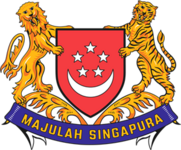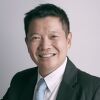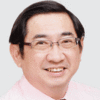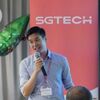Singapore
| Singapore | |
|---|---|
| [[File:|center|450px|x150px|link=https://www.singstat.gov.sg]] | |
 | |
| Seal | |
| Singapore Map | |
| Type of Municipality | City |
| Date Established | 3 June 1959 |
| Area | 733.1 sq.mi1,898.722 sq.km <br />469,184 Acres <br />1,898,721,669 sq.meter <br />20,438,828,000 sq.ft <br /> |
| Elevation | 45ft13.716 m <br /> |
| Population | 5,453,6005,453,600 people <br /> |
| Timezone | UTC+8 |
- Members
Singapore officially the Republic of Singapore, is a sovereign island city-state in maritime Southeast Asia. It lies about one degree of latitude (137 kilometres or 85 miles) north of the equator, off the southern tip of the Malay Peninsula, bordering the Strait of Malacca to the west, the Riau Islands (Indonesia) to the south, and the South China Sea to the east. The country's territory is composed of one main island, 63 satellite islands and islets, and one outlying islet, the combined area of which has increased by 25% since the country's independence as a result of extensive land reclamation projects. It has the third greatest population density in the world. With a multicultural population and recognising the need to respect cultural identities, Singapore has four official languages; English, Malay, Mandarin, and Tamil. English is the lingua franca. Multiracialism is enshrined in the constitution and continues to shape national policies in education, housing, and politics.
Activities

|
Deployment of user-friendly, secure and sustainable federated public Wi-Fi systems | |
| To deploy a sustainable federated public Wi-Fi solution across Singapore that is has easy to use secure authenticated access and jointly develop a set of best practices with cities, industry players, and the academia to promote coordinated public Wi-Fi deployment, to address signal interference issues, standardizing user experience and security. | ||

|
KPIs to Measure Urban Performance of 15 Min City | |
| KPIs to Measure Urban Performance of 15 Min City | ||

|
Project GRACE | |
| The present Public Key Infrastructure (PKI) is known to be inadequate for the current scale of the Internet and the situation is exacerbated with the advent of IoT. Project GRACE (Graceful Remediation with Authenticated Certificateless Encryption) implements a security architecture using an advanced form of pairing-based cryptography called Verifiable Identity-based Encryption (VIBE) to provide a simple, scalable and secure key management for the cloud services, the IoT and indeed the Critical Information Infrastructure (CII) which are otherwise vulnerable to the extant and new cyber-physical attacks. | ||

|
Reduced customs clearance time with virtual extension of sea ports | |
| Develop and deploy electronic cargo tracking solutions in different settings (sea port, dry port and manufacturing FTZ) and across geographies (traversing from landlocked locations to ports, in East Africa and in Asia), for expedited customs clearance and enhanced trade facilitations. The solution is integrated across technology stacks, including end-devices, platforms and analytics, by ecosystem of accredited vendors. Involves security/field enforcement officials, customs officials, application developers, telco service providers, shippers and consignees. | ||

|
Smart Wide Area Protection and Security for All from Concorde Security | |
Concorde provides Wide Area Protection for a Cluster of buildings from a mobile surveillance vehicle (called I-Man Facility Sprinter or “IFS”) manned by a 2-3 man specialist team.
| ||

|
The Inclusive Smart City | |
| An AI-augmented skills-based jobs placement programme by the Singapore infocomm Technology Federation (SiTF) to help mature and displaced workers transition effectively into the tech sector. The programme will be a combination of AI tools and high-touch engagements to drive outcomes.
This effort is also integrated into a larger national initiative called TeSA (TechSkills Accelerator) to improve the employability of Singaporeans and to meet the demand for skilled tech workforce by different industries across the economy. TeSA involves key industry and employer associations, tech companies in different sectors of the economy, key enterprise users of technology in different industries, government agencies both economic and regulatory ones, labour unions, students and professionals. TeSA is steered through a national Governing Council and various Sector Committees representing different industries. TeSA is led by the Infocomm Media Development Authority of Singapore (IMDA), with other partner agencies. Both TeSA and talentguru AI-driven platform have been launched. New efforts are being developed and launched on an on-going basis. | ||





